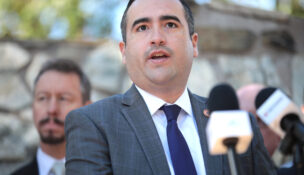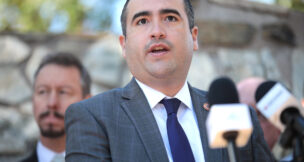Revived bill aims to restrict public funding for abortion services in Arizona
Jamar Younger Arizona Capitol Times//August 1, 2025//
Revived bill aims to restrict public funding for abortion services in Arizona
Jamar Younger Arizona Capitol Times//August 1, 2025//
Key Points:
-
Rep. Lupe Diaz plans to reintroduce a bill that would prevent the state from providing public funding to clinics that promote or perform abortions
-
Opponents of the proposed bill say it would restrict health care access for low income patients
-
Republican lawmaker plans to revive bill to ban public funding for abortions
A Republican lawmaker wants to revive a bill that would prohibit the state from providing public funding to facilities and clinics that perform or promote abortions.
Rep. Lupe Diaz, R-Benson, said he plans to reintroduce his measure to prevent the state from entering into a contract or providing grants to any person or facility that provides or advises clients to seek an abortion.
Under current law, Arizona doesn’t allow public funding for most abortions except for emergencies, but Diaz’s proposal would expand upon that provision.
“For me and … all of the Republican Caucus, is that it is an individual and that individual deserves the same rights as any citizen under the constitution, which means protection of life,” said Diaz, who serves as the pastor of a nondenominational church in Benson. “Once you begin to violate … to cross that line, then, yeah, I’m going to restrict every dollar that I can from going to promote, perform and provide an abortion.”
Diaz’s original bill, House Bill 2547, passed the House along party lines before moving to the Senate, where it was approved in the Senate Government Committee. The measure then stalled before being approved by the chamber.
Supporters of the bill acknowledged that voters approved Proposition 139 last fall, which enshrines the right to an abortion in the state Constitution. However, they opposed the idea of taxpayer money funding facilities that advertise the procedure as a viable option for unwanted pregnancies.
“The crux of this whole issue is whether the taxpayer should be paying for that promotion,” said U.S. Rep Andy Biggs, R-Ariz, at the Senate Government Committee hearing on March 19. “So if you’re defining promotion as someone going in and being referred to a specific specialist for medical care, in this instance, there is no rationale that says that the public should have to be paying for that.”
The legislation drew strong opposition from medical professionals and abortion-rights groups that criticized the bill for attempting to circumvent the new constitutional right to abortion.
According to those groups, the bill could limit access to health care options, affect low income people who rely on publicly funded clinics for reproductive health care and lead to the closure of facilities that provide abortions and other health care.
“Arizonans spoke loud and clear last election when they overwhelmingly approved Prop 139. Yet extremists in the state legislature continuously target and stigmatize health care professionals and health centers at the expense of the health and well-being of Arizona’s already-vulnerable communities,” said Planned Parenthood Advocates of Arizona Interim President and CEO, April Donovan, in a statement. “We made clear this legislative session that HB 2547 is unpopular among voters and completely misleading – the bill was stalled and should not be revived.”
Diaz disagreed with the idea that the legislation would restrict health care services.
“There’s still going to be services provided. And for the low income, there’s going to be plenty of medical availability for them,” he said. “They just can’t perform abortions or promote them.”
Diaz originally said on X on June 26 that he was going to bring back the bill after the U.S. Supreme Court ruled in Medina v. Planned Parenthood South Atlantic case that a private citizen couldn’t sue South Carolina for excluding Planned Parenthood from receiving state Medicaid funding.
Although the ruling allows South Carolina to move forward with its plans, it still doesn’t address the legality of removing government funding from clinics that perform abortions, said James G. Hodge Jr., the Peter Kiewit Foundation professor of law and director of the Center for Public Health Law and Policy at Arizona State University’s Sandra Day O’Connor College of Law.
“They did not make any statement about whether South Carolina’s maneuver here was actually legally sound,” Hodge said. “We still don’t know exactly whether or not that will fly with the U.S. Supreme Court. They have not clarified that. My best guess is they will probably allow it.”
Arizona is one of 38 states with laws that restrict the use of public resources for abortions to varying degrees, according to data compiled in November 2022 by Temple University’s Center for Public Health Law Research.
Most of the state policies mirror federal law by restricting funding for abortions except for emergencies.
States have intensified efforts to limit abortions since the Supreme Court reversed Roe v. Wade and withdrew the constitutional right to an abortion in 2022, Hodge said.
However, Diaz’s bill might face obstacles with Democratic Gov. Katie Hobbs, who has expressed her support for protecting abortion rights and women’s healthcare.
But that still won’t deter Diaz, who referred to Prop. 139 as a “special interest initiative.”
“I believe in good and evil,” he said. “And this was nothing but evil.”














































